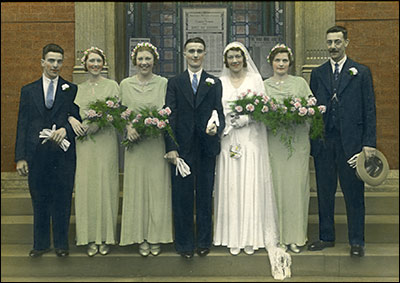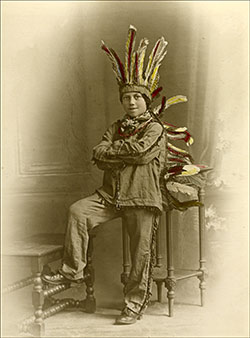|
|
|||
| Article taken from "A Fifties Childhood" by Susan Manton |
|||
|
A Fifties Childhood: My Mum
|
|||
|
|||
|
My Mum was Lillian Rose Keech (nee Carr), born on
The stairs led off from the main room but had a door at the bottom to seal off draughts. The main room had a cooking range fireplace where a fire burnt continuously. There were ovens both sides of the range and the kettle boiled constantly on the fire. A large table dominated the room giving little space to move around. Granddad had a large wooden armchair (like a rocker with legs) to the left of the fireplace, next to a huge wireless (radio). Grandma had an old squashy leather armchair, covered with a blanket, on the other side of the range. A rag rug was in front of the fire. The room as I remember it was always like this. It never changed in all the time that I knew it. The front room was hardly used. A huge wooden dresser with mirror backed glass cupboards each side filled one wall. The best china was kept in this. The piano was kept in here. My Mum learnt to play but I’m not sure about any of the other children. I never knew that they did and certainly never knew of any musical talent amongst them. An Aspidistra stood on a “What-not” in front of the one window, which was screened by heavy lace curtains. A heavy chenille curtain kept out the draughts from the front door which led straight out on to
There was a scullery with running water and a meat safe with a grill to keep out the flies was opposite the back door. There was no bathroom, but a shared toilet down the yard. How on earth ten people lived like this I don’t know but I suppose this was the norm in those days and so it was not unusual. By today’s standards it seems unbelievable but maybe people learnt to be more tolerant to each other by living in such close proximity. There was certainly a much closer sense of community and everyone looked out for each other. My Mum started working, in a factory, at the age of twelve. It wasn’t actually lawful for her to do this but they needed the money. She was told to say that she was just running errands if she was challenged. She never was. I suspect there were many others doing the same thing.
As Mum was one of the older children she had jobs to do at home. They all had their own places around the table for meals and as Mum sat near to the pantry her job was to hand round the plates that were on a high shelf. One day Mum reached up to take down the plates, overbalanced and the plates flew over her head on to the floor. She didn’t say how many were broken but it would have been a disaster. On Sunday the joint of meat would be taken to the local baker’s shop to cook in his large oven. Everyone did this. Mum went to collect the meat at dinnertime. Finding it rather heavy and hot to carry she decided to rest on a friend’s wall on the way home. The roasting tin tipped up, landing the meat in the friend’s front garden. Mum was horrified. She quickly looked around, picked it up, dusted it down and replaced it in the tin. No-one was any the wiser. Grandma was a very tiny lady – she couldn’t have been five feet tall. She had very tiny feet – I think they were a size three but they were very wide. Her hair was long and thin and she twisted it into a bun at the back of her head using long hair pins to secure it. I remember her as a quiet gentle lady. Granddad had a small holding and kept pigs and hens in addition to growing fruit and vegetables and so although they were poor they had a good supply of food. Grandma baked her own bread and made jam. Milk had to be fetched each day from the farm. I am unsure of Granddad’s main job but I believe that it was connected with the shoe industry. As this was the main industry of the town this was where most people worked. He worked on his small holding in the evenings and at week-ends and the boys helped out. My Uncle Fred was especially interested in pigs and later became a pig farmer, running a farm called “Eastfield Farm” right at the top of
Granddad suffered from indigestion and always had a box of Rennies in his pocket, chewing throughout the day like sweets. He always tried to get you to eat one but after the first time you didn’t fall for it. He often gave me a threepenny bit to spend. Grandma and Granddad were married for over sixty years. A short time after Granddad died, the houses in
To us busy folks today, sitting still by the fire enjoying a book or just doing nothing - thinking back over your life - would seem boring but to Grandma who had worked extremely hard all her life this was luxury indeed. I can’t imagine having so many children. One baby died and so this would have been nine pregnancies. No disposable nappies, no washing machines, no running hot water, no electricity, coal fires to be kept going, meals to cook. No wonder Grandma enjoyed the luxury of not having anything pressing to do when she got older. She always wore a wrap-a-round pinafore – one that she did her jobs in during the morning and a clean one to sit in during the afternoon in case visitors came. In the olden days you didn’t visit in the morning as that was when all the jobs were done and Grandma still thought that this was how it should be. Grandma had a dog - Sukey - a black cocker spaniel. She was very placid and although I have never really liked dogs very much she was always very calm and let me play with her without barking or upsetting me. Our next door neighbour, Mrs. Timpson, also had a golden cocker spaniel, Timmy, who used to sit at the end of the entry looking up and down the street. Sometimes I would take Timmy up to the paper shop in One of Mum’s school friends was the sister of H. E. Bates, the Rushden author. She had a swing in her back garden and Mum was invited round to have a go on it. Much later a colleague, Madge, who worked with Mum married H.E.Bates and moved to I don’t know where Mum met my Dad as he lived in Irthlingborough but I do remember her telling me, that before she had actually met him, she saw him walking along the town one day and said to her friend “He looks nice”. She obviously got to know him quite well later on as they were married at the Independent Wesleyan Chapel in the High Street on On her marriage she was presented with the silver tea-pot, milk jug and sugar bowl that I still have in the china cabinet to-day. When I was young we used the tea-pot every Sunday, but I never remember using the milk jug and the sugar bowl. The church was a very big part of her life and she was a member there for over seventy years, taking a very active part in all the different areas of the church. In her later years she began to write poems, mainly for use at the Women’s Auxilliary meetings on Thursday afternoon, which, considering that she left school at twelve, makes me feel very proud of her. |
|||

